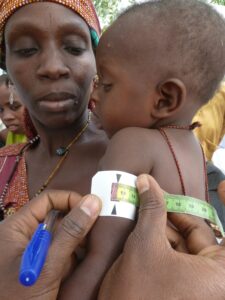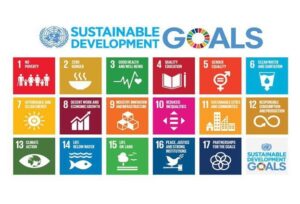By Tawanda Mukwekwezeke
The global issues of water scarcity and malnutrition are closely intertwined. An exploration of this complex relationship reveals how lack of access to clean water perpetuates the cycle of hunger and poor health. In regions without reliable access to safe drinking water, people often suffer and die from preventable illnesses that can be eliminated by access to clean water.
Did you know that almost two-thirds of the world’s population, a staggering four billion people, experience severe water scarcity for at least one month every year? It’s like being stuck in a never-ending line just to get a sip of water. It’s difficult to imagine how challenging life can be when something as basic as water is in such short supply. Inadequate water supply affects over two billion people in various countries worldwide. Half of the world’s population could be living in areas with water scarcity by 2025.
Water Plays a Critical Role in Malnutrition
Lack of access to clean water and proper sanitation facilities have a significant impact on malnutrition, particularly in developing nations like Niger. Niger, along with two other central Sahel nations, is listed among the 15 countries hardest hit by an unprecedented global food and nutrition crisis, according to UN agencies. These agencies have warned that faster progress is needed to tackle acute malnutrition among children.
When people don’t have access to safe water, they are often forced to use contaminated sources for drinking and cooking, which leads to a higher risk of waterborne diseases like diarrhea and cholera, both of which reduce nutrient absorption in the body. Unsafe water also affects hygiene and food preparation practices, as hands can’t be washed properly before handling food or caring for children, and food and utensils can’t be thoroughly cleaned, which increases the risk of infection.
As Manuel Fontaine, the Director of Emergency Programmes at UNICEF put it: “No matter how much food a malnourished child eats, he or she will not get better if the water they are drinking is not safe.” This statement highlights the critical role of safe drinking water in reducing malnutrition and improving child health in developing nations like Niger.

Source : Jane Miller/DFID
Let’s Wear Nigerien Shoes a Bit
Picture this: Niger is among the countries suffering the most from water scarcity. The lack of access to safe and clean water has far-reaching consequences. It not only affects nutrition, but it also hampers education and economic development. Furthermore, the lack of nearby safe water sources means that girls and women in Niger often have to walk for hours each day to fetch water for their families. This not only puts a tremendous strain on their physical health and well-being, but it also means that they are unable to attend school or engage in income-generating activities, which perpetuates the cycle of poverty and deprivation. The impact of water scarcity on education and economic development is just one aspect of the far-reaching consequences of the lack of access to safe and clean water in Niger and other countries.
Wells Bring Hope Is Tackling some of the United Nations’ Sustainable Development Goals (SDGs).
The United Nations has 17 Sustainable Development Goals (SDGs) and their sixth, Clean Water and Sanitation goes hand and hand with Wells Bring Hope’s mission. This UN Goal states: “Clean, accessible water for all is an essential part of the world we want to live in.” Like the UN, Wells Bring Hope recognizes the far-reaching impact water scarcity has on health, nutrition, education, economic development, and happiness. We’re working hard to bring hope to communities in need and changing lives for the better.
Wells Bring Hope’s work in Niger supports multiple SDG goals. By providing safe and clean water, we contribute to SDG 1 (no poverty), SDG 2 (zero hunger), and SDG 3 (good health and well-being). Our focus on gender equality aligns with SDG 5.

Source : Wikimedia
https://www.unicef.org/wash/water-scarcity
https://reliefweb.int/report/niger/warnings-over-child-malnutrition-rising-niger-year-climate-crisis-conflict-take-toll
https://www.un.org/sustainabledevelopment/sustainable-development-goals/
https://globalnutritionreport.org/resources/nutrition-profiles/africa/western-africa/niger/


